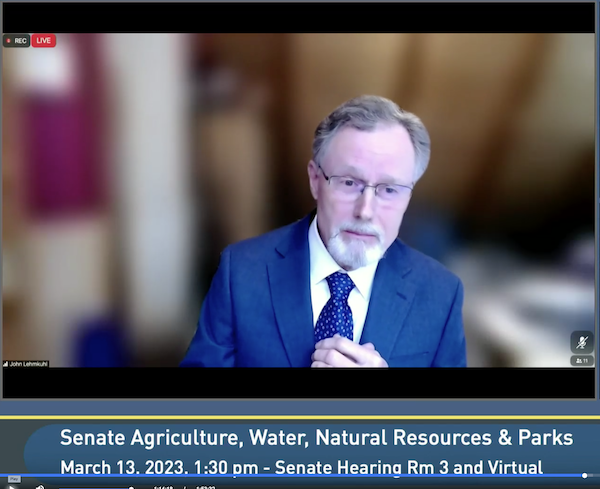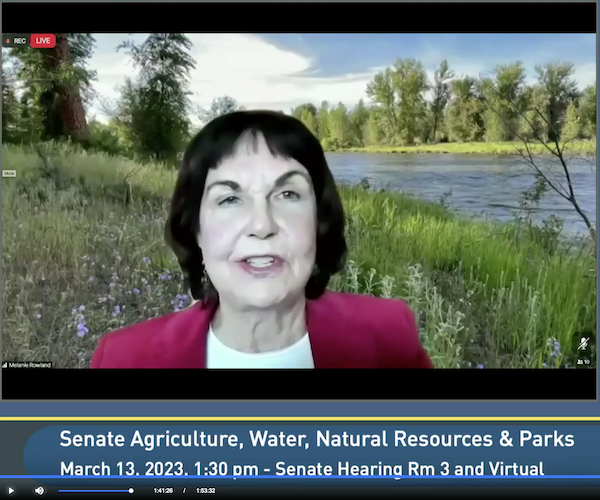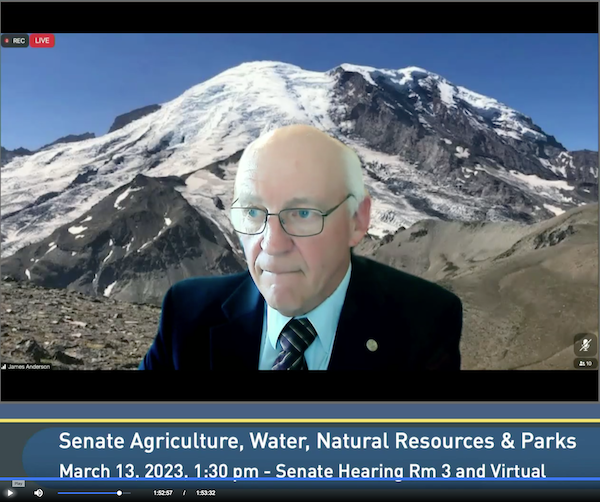
More WDFW Commissioners Appear Before Senate Committee
Three more Washington Fish and Wildlife Commission members appeared before a state Senate committee today and on Thursday they and another trio will all have a recommendation vote on their appointments to the citizen panel.
John Lehmkuhl, Melanie Rowland and Jim Anderson all appeared remotely before the Agriculture and Natural Resources Committee this afternoon, detailing their background, professional working lives, why they were interested in serving on WDFW’s policy oversight body, and taking questions from senators, just as Molly Linville, Tim Ragen and Woody Myers did last Thursday.
Lehmkuhl, a retired Forest Service researcher, said his first year on the commission had been a “real roller coaster” ride, having been dropped by the Governor’s Office in the middle of the debate over the limited-entry spring black bear hunt. He said rhetoric between nonhunters and hunters had “gotten out of hand” and noted a recent lawsuit by the national Sportsmen’s Alliance Foundation to oust fellow member Lorna Smith.

He insisted that spring bear hunting is still allowed “for management purposes,” an attestation that will be put to the test yet again later this week when the commission will vote on three more petitions around the hunt, including beginning rulemaking for a 2024 season, and to protect deer fawns and elk calves and public timberlands. In response to a question from Sen. Shelly Short (R-7), Lehmkuhl said over the past 20 to 30 years of the hunt there was no data showing it was successful in addressing those issues.
“Why should we do something we don’t know is effective or not?” he said.
Asked by Sen. Jesse Salomon (D-32) about Columbia River gillnets, wild salmon and pound nets, like the one being tested by the Wild Fish Conservancy near Cathlamet, Lehmkuhl said he was a “novice” on fisheries issues, but termed pound nets “potentially a great solution” but he had questions about their scalability to replace current salmon harvest and pinniped attraction.
On gillnets – Salomon was a cosponsor of a failed bill that would have banned the nontribal commercial use of them on the Columbia – Lehmkuhl said he “didn’t have strong opinions” one way or another and termed himself “an open book.”
Rowland, on the other hand, said bycatch was an issue and a way to limit the catch of Endangered Species Act-listed salmon is needed. A retired ESA attorney for NMFS with “many, many years” in the salmon world – a place she said where only declines have occurred and no recoveries, let alone little progress made – she also twice pointed to habitat and habitat restoration as the primary key for restoring the runs.

As by Sen. Short if there was any on-the-ground management she’d like to see in relation to wildlife, Rowland indicated the questions she asks revolves around the role of a species in the ecosystem, not simply as a stand-alone species. She pointed to conserving biodiversity as a whole as well as conserving ecosystem function as “the direction we need to be going … focusing beyond individual species.” Pointing back to the spring bear hunt and killing individual bruins in specific areas, she said the role of those animals in sustaining that local ecosystem “is the question we need to ask.”
Where Rowland can be abrasive, Anderson felt he can “share the sandbox with people pretty well.” The retired executive director of the Northwest Indian Fisheries Commission and a lifelong hunter and angler, he said he values community service and being on the state commission is a “real gift to serve.”

Asked by Sen. Kevin Van De Wege (D-24) his thoughts on pound nets and why there were no salmon allocated last year for testing, Anderson said it “holds promise” and he believed fish would be available in 2023. While in favor of more tools in fishery managers’ proverbial toolbelt, he too had questions, namely around the “unproven technology,” harvest handling, permitting more of the stations and the ability of the commercial industry to engage and gear up, but as a concept was having a moment to show its stuff and potentially be an alternative.
Where last week Linville, Ragen and Myers were told by Van De Wege that senators would work to confirm them, there was no similar glowing public sendoff on offer for Lehmkuhl, Rowland and Anderson this afternoon, but that could have also been just because today’s public hearing was chaired by Salomon instead of Van De Wege and lawmakers had a chance to get out of the meeting six minutes before scheduled.
As it stands, the Senate committee will meet Thursday afternoon for a confirmation recommendation vote on all six commissioners to the full upper chamber. Commissioners can serve without being confirmed.
